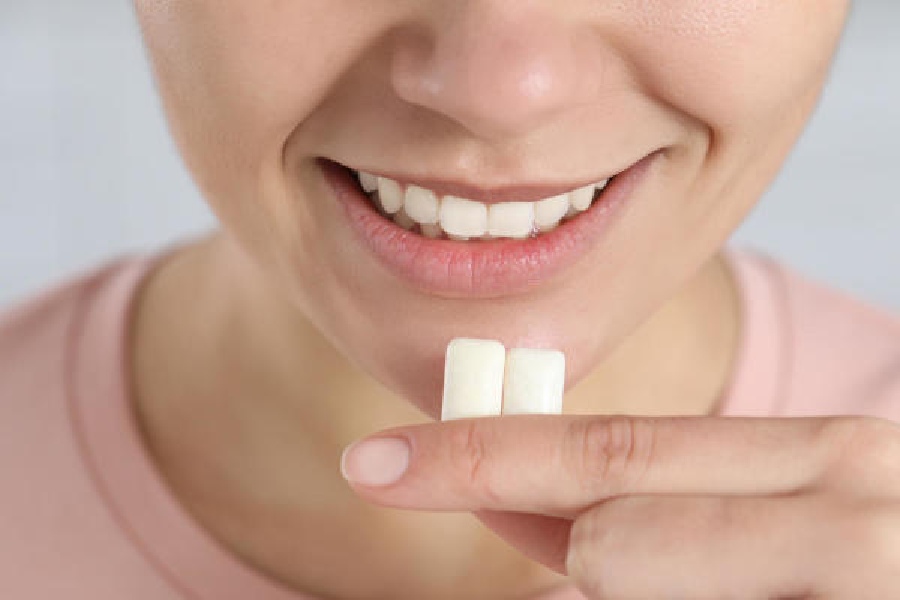Chewing a piece of gum spurs the production of saliva, which can protect your teeth from erosion by neutralising the acidity in your mouth, said Dr Peter Arsenault, a dentist and professor at Tufts University School of Dental Medicine in the US.
Similar to brushing, the gum’s movement around the mouth may also remove bits of food and plaque from your teeth and around your gums, Dr Arsenault said. The extra saliva, he added, may also improve your breath, because bad breath is exacerbated by a dry mouth.
Sugar-free gum options are generally better for your teeth than those made with sugar, which feeds the bacteria that can cause tooth decay. Gum made with the sugar substitute xylitol may provide added dental benefits, because it can reduce the cavity-causing bacteria in your mouth. In a 2022 meta-analysis of 30 studies, researchers found that chewing xylitol-containing gum (or eating xylitol-containing candies) three to five times a day after meals could reduce cavity risk by 17 per cent.
Less heartburn
When swallowed, the extra saliva from gum chewing may help to neutralise acid in the oesophagus, leading to fewer heartburn symptoms, said Dr Aditi Stanton, a gastroenterologist in Cincinnati, US. There is little research on the issue, but in one 2005 study of 31 people who were prone to acid reflux, researchers found that chewing sugar-free gum for 30 minutes after eating heartburn-inducing foods led to reduced acid levels in the oesophagus.
Improved cognition
More research is needed, but some limited evidence suggests that chewing gum may help some people concentrate and learn. In a 2018 study of 40 adults, researchers found that those who chewed gum while presented with physiology lessons performed better on tests afterward than those who didn’t chew gum.
Other evidence suggests that chewing gum could potentially improve mood and alleviate stress, at least over the short term — similar to how some people shake their legs or twirl their hair when they are nervous, said Jenna Watson, a therapist in Orlando, Florida, US, who focuses on stress and burnout.
Researchers don’t know why but there is some evidence that gum chewing can activate various parts of the brain by increasing blood flow to those regions.
Gum chewing may exacerbate jaw problems among people who are prone to issues or injuries with the temporomandibular joint, or TMJ, which connects the jawbone to the skull, Dr Arsenault said. This includes people who grind or clench their teeth. Gum chewing can tire the jaw muscles and lead to clicking, popping, headaches and facial muscle fatigue, he said.
To balance the oral health benefits with the potential jaw issues, Dr Arsenault recommended chewing gum for only short periods of time after eating — say, for 15 to 20 minutes. If you have a TMJ injury or disorder, however, you may want to avoid chewing gum completely, he added.
Digestive problems
While chewing a piece of gum can help with acid reflux symptoms in some people, it can actually worsen those symptoms for others. In some cases, gum chewing can relax the lower esophageal sphincter, a muscle at the bottom of the oesophagus that prevents acid from entering it. When acid enters the oesophagus, it can lead to heartburn symptoms.
When people chew gum, especially if they do so vigorously or rapidly, they may also inadvertently swallow air, which can cause bloating, gas and burping. Common sugar substitutes in gums, like xylitol and sorbitol, “can have laxative-like effects”, she added, increasing the risk of developing diarrhoea, abdominal pain, cramping or bloating.
Microplastic exposure
Many gums are made using plastics like polyethylene and polyvinyl acetate. This helps give gum its elasticity. A recent study found that these plastics can be released into our mouths, but it’s unclear how that affects health, said Katrina Korfmacher, an environmental health researcher at the University of Rochester Medical Center in the US.
The new study suggests that most of these plastics are released from gum within several minutes, so if you tend to spit out gum and start a new piece as soon as it loses its flavour, it may be better to stick with the same piece for as long as you can.
And, Korfmacher added, to be a good environmental steward, “make sure you don’t throw it on the ground”.










